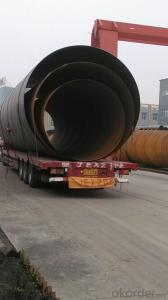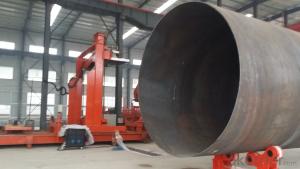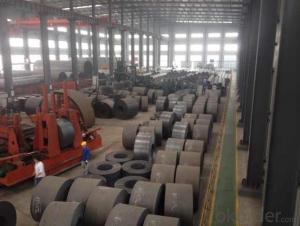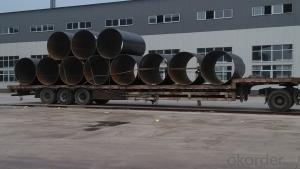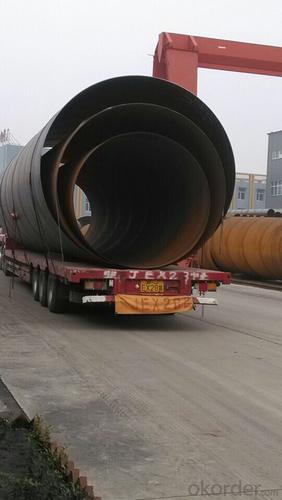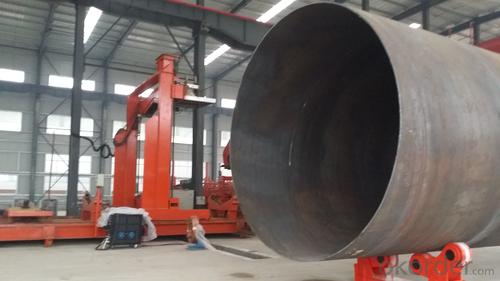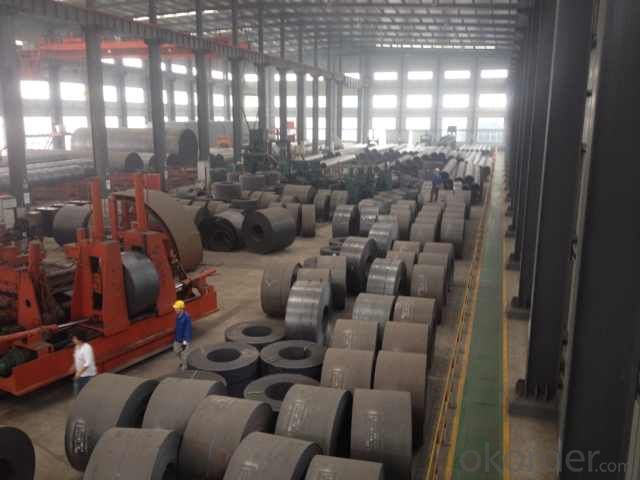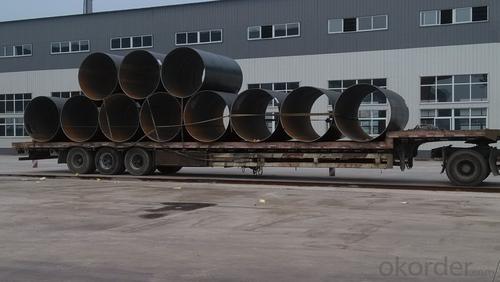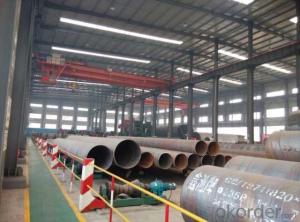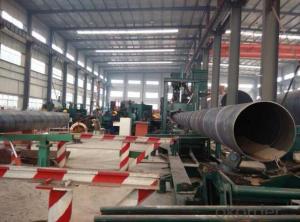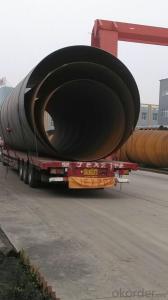SSAW STEEL PIPE 219-3920MM API/ISO/ASTM/JIS
- Loading Port:
- China Main Port
- Payment Terms:
- TT OR LC
- Min Order Qty:
- -
- Supply Capability:
- -
OKorder Service Pledge
OKorder Financial Service
You Might Also Like
Packaging & Delivery
Packaging Detail: | standard export packing or as customer's requirement |
Delivery Detail: | within 10 - 30 days |
Specifications
Spiral Welded Steel Pipes and Tubes
1.Material:Q195-Q235
2.Length:1-12m
3.WT:1.0-14mm
4.O.D.:219-3920mm
Product Description:
1.Material : Q235,Q345,L245,L290,L360,L415,L450,L485,GrB,X42,46,X52,X56,X60,X65,X70,X80,X100
2,Standard: SY/T5037-2000,GB/T9711-2011,API Spec 5L PSL1/PSL2,ASTM A252\A53,ISO3183,DIN17172,EN10217,JIS G3457,AWWA C200,ASTM A139,ASTM A671,ASTM A672
3.Wall thickness: 3.0mm-30mm
4.Outer diameter: φ219mm-3920mm
5,Length: 5m-12m or as customer requirement
6,Corrosion protection standard: DIN30670,DIN30671, AWWAC210, AWWA C203, SY/T0413-2002,SY/T0414-2002
7,Application: Oil, gas, natural gas, water pipe, thermal electricity pipe, steel structure engineering, etc
Q195-Q345 Material Steel Pipe's Materials
Elements | Chemical Compsition% | Mechanical Property | ||||||
| C% | Mn% | S% | P% | Si% | Yield Point (Mpa) | Tensile Strength(Mpa) | Elongation |
Q195 | 0.06-0.12 | 0.25-0.50 | <0.050 | <0.045 | <0.030 | >195 | 315-430 | 32-33 |
Q215 | 0.09-0.15 | 0.25-0.55 | <0.05 | <0.045 | <0.030 | >215 | 335-450 | 26-31 |
Q235 | 0.12-0.20 | 0.30-0.70 | <0.045 | <0.045 | <0.030 | >235 | 375-500 | 24-26 |
Q345 | <0.20 | 1.0-1.6 | <0.040 | <0.040 | <0.55 | >345 | 470-630 | 21-22 |
- Q: What is the average lifespan of a steel pipe?
- The average lifespan of a steel pipe can vary depending on various factors such as the quality of the steel, the environment it is exposed to, and the level of maintenance. However, with proper installation and maintenance, a steel pipe can typically last anywhere from 20 to 100 years.
- Q: What are the safety precautions while working with steel pipes?
- When working with steel pipes, it is important to follow several safety precautions. Firstly, always wear protective gear such as gloves, safety glasses, and steel-toed boots to prevent injuries. Secondly, ensure that the work area is properly ventilated to avoid inhaling harmful fumes or gases. Additionally, use caution when handling heavy pipes to prevent strains or sprains. Lastly, be mindful of potential hazards such as sharp edges, hot surfaces, or falling objects, and take appropriate measures to minimize risks.
- Q: How do steel pipes handle soil movement?
- Steel pipes are highly resistant to soil movement due to their strength and durability. The rigid nature of steel pipes allows them to withstand ground shifting and settling without deforming or breaking. Additionally, steel pipes are often installed with proper anchoring and support systems to further enhance their ability to handle soil movement.
- Q: How are steel pipes used in the oil and gas pipeline transportation?
- Steel pipes are used in oil and gas pipeline transportation due to their durability, strength, and resistance to corrosion. They are used to transport crude oil, natural gas, and other petroleum products over long distances. Steel pipes ensure the safe and efficient transfer of these resources from production sites to refineries and distribution centers, ensuring a reliable supply of energy for industries and consumers.
- Q: Why seamless steel pipe called seamless steel pipe?
- Seamless is relative to welded steel pipe, because welded steel pipe is welded with steel strip, seamless steel pipe is made of whole round steel empty, no welding seam.
- Q: Are steel pipes suitable for underground installations?
- Yes, steel pipes are suitable for underground installations. Steel pipes have been widely used for underground applications due to their durability, strength, and resistance to corrosion. They are able to withstand high pressure and extreme temperature variations, making them ideal for transporting various substances such as water, gas, and oil underground. Additionally, steel pipes are highly resistant to environmental factors such as moisture and chemicals, which are commonly found in underground environments. With proper coatings and cathodic protection systems, steel pipes can have an extended lifespan and remain intact even in harsh underground conditions. Therefore, steel pipes are a reliable and suitable choice for underground installations.
- Q: What is the difference between steel pipes and aluminum pipes?
- The main difference between steel pipes and aluminum pipes lies in their material composition. Steel pipes are made of an alloy primarily composed of iron and carbon, making them strong, durable, and resistant to corrosion. On the other hand, aluminum pipes are made of aluminum, which is a lightweight metal known for its excellent corrosion resistance and high thermal conductivity. Aluminum pipes are typically used in applications that require lightweight materials or where corrosion resistance is crucial, while steel pipes are commonly used in heavy-duty applications that require strength and durability.
- Q: What is the difference between steel pipe and aluminum pipe?
- Steel pipes and aluminum pipes differ primarily in their composition and physical properties. Steel pipes are composed of iron and carbon, with added elements for strength and corrosion resistance. In contrast, aluminum pipes are made entirely of lightweight and highly corrosion-resistant aluminum. The weight of the pipes is a significant distinction. Steel is denser than aluminum, making steel pipes heavier and more robust. This characteristic makes steel pipes ideal for applications requiring structural strength and load-bearing capabilities. On the other hand, aluminum pipes offer advantages due to their lightweight nature. They weigh only about one-third of steel pipes, making them easier to handle, transport, and install. This lightweight property is especially beneficial in industries such as aerospace and automotive, where weight reduction is crucial. Corrosion resistance is another important consideration. Steel pipes are prone to rust and corrosion, especially in moist or corrosive environments. To address this issue, steel pipes are often coated or galvanized. In contrast, aluminum pipes naturally resist corrosion due to the formation of a protective layer of aluminum oxide on their surface. Cost is also a factor to consider. Generally, steel pipes are more cost-effective due to lower raw material and manufacturing costs. However, long-term maintenance costs and lifespan may vary between steel and aluminum pipes, so specific requirements and durability should be taken into account. In conclusion, the difference between steel and aluminum pipes lies in their weight, strength, corrosion resistance, and cost. Steel pipes are heavier, stronger, and more prone to rust and corrosion but are generally more cost-effective. Aluminum pipes are lightweight, corrosion-resistant, and costlier but offer advantages in weight reduction and specific applications requiring corrosion resistance. The choice between steel and aluminum pipes depends on the project's needs and desired properties for optimal performance.
- Q: Can steel pipes be used for offshore oil and gas platforms?
- Yes, steel pipes can be used for offshore oil and gas platforms. Steel pipes are commonly used in offshore oil and gas platforms due to their durability, strength, and resistance to harsh marine environments. These pipes are typically made of high-grade steel alloys that can withstand the extreme pressures and temperatures associated with offshore drilling and production activities. Furthermore, steel pipes are versatile and can be easily welded, allowing for the construction of complex pipeline networks on offshore platforms. Additionally, steel pipes can be coated with protective coatings such as epoxy or anti-corrosion coatings to enhance their resistance to corrosion and extend their lifespan in the offshore environment. Overall, steel pipes are a reliable and widely used choice for transporting oil and gas on offshore platforms.
- Q: Are steel pipes resistant to impact or external forces?
- Yes, steel pipes are generally resistant to impact or external forces due to their inherent strength and durability. They can withstand high pressure, heavy loads, and harsh environmental conditions, making them suitable for various applications, including construction, transportation, and industrial purposes.
Send your message to us
SSAW STEEL PIPE 219-3920MM API/ISO/ASTM/JIS
- Loading Port:
- China Main Port
- Payment Terms:
- TT OR LC
- Min Order Qty:
- -
- Supply Capability:
- -
OKorder Service Pledge
OKorder Financial Service
Similar products
Hot products
Hot Searches
Related keywords
